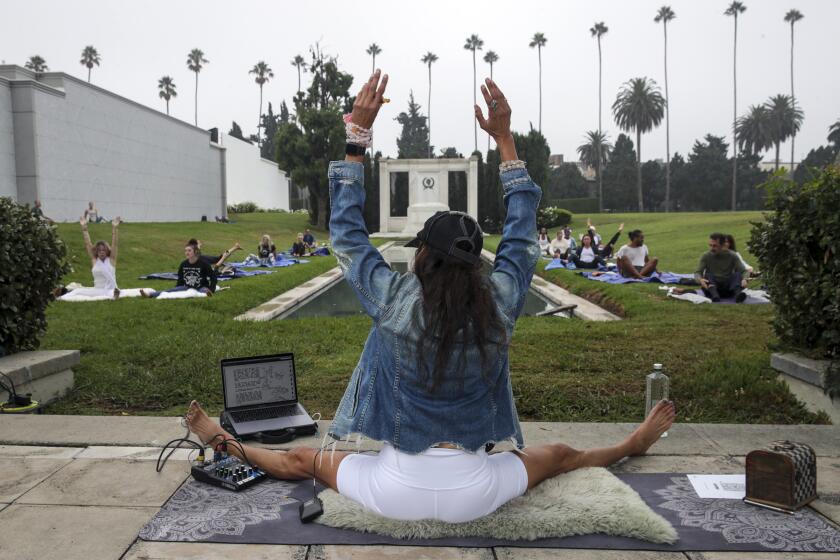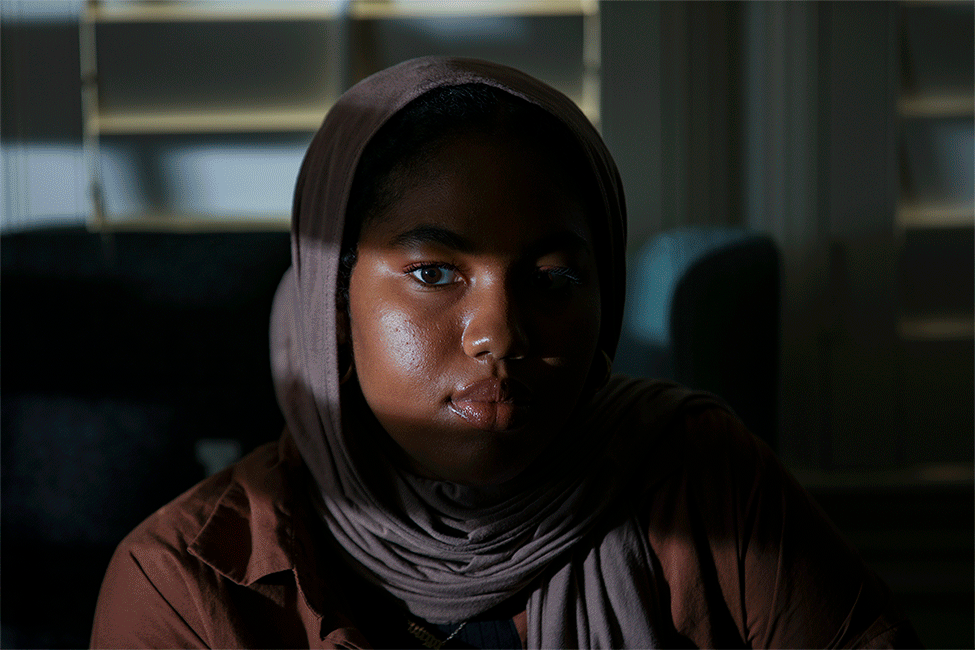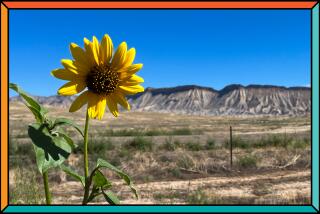An American road trip through troubled times
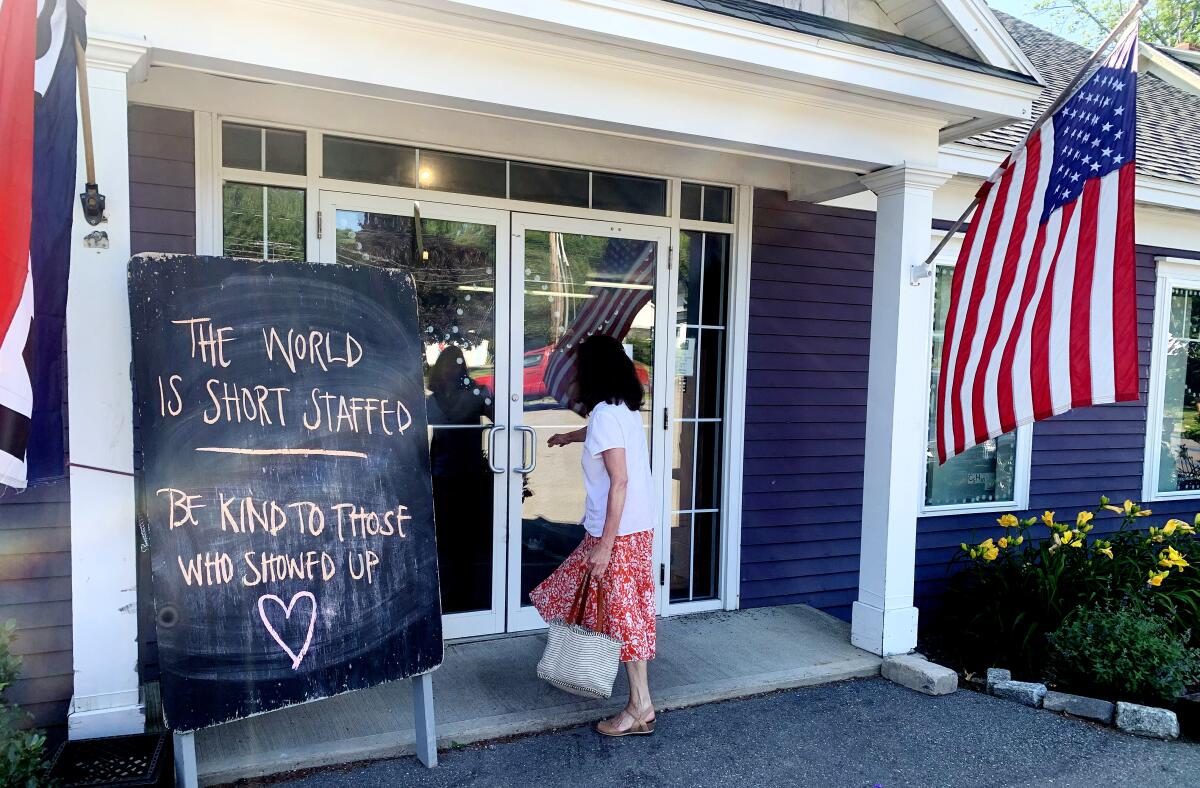
- Share via
I was driving cross-country to visit my friend who has a farmhouse in Maine.
She was dying. She told me I needed to accept that fact before I got there so we could get on with enjoying our visit.
I set a route that would carry me through wide open places and small towns. I was going to write about the parts of America I saw along the way. I worried I might be too raw, too unsettled, to try to understand the country stretching before me. Then I decided that was the right state of mind for a summer of vaccines, variants, disaster, division, reckoning, rage and floundering forward. I woke up on a Monday morning and headed east from Fresno.
Outside of Yosemite National Park, I waited in a line that didn’t move.
I had my car parked in the shade, windows down. Murphy, my Lab, was in the backseat.
Each time his nostrils flared, I tensed, even though I told myself it was someone eating pizza and not wildfire he was smelling. A heatwave was building, with a week of record-breaking temperatures predicted across the West.
“Where ya going?” asked a ranger who laughed as she gave Murphy a biscuit.
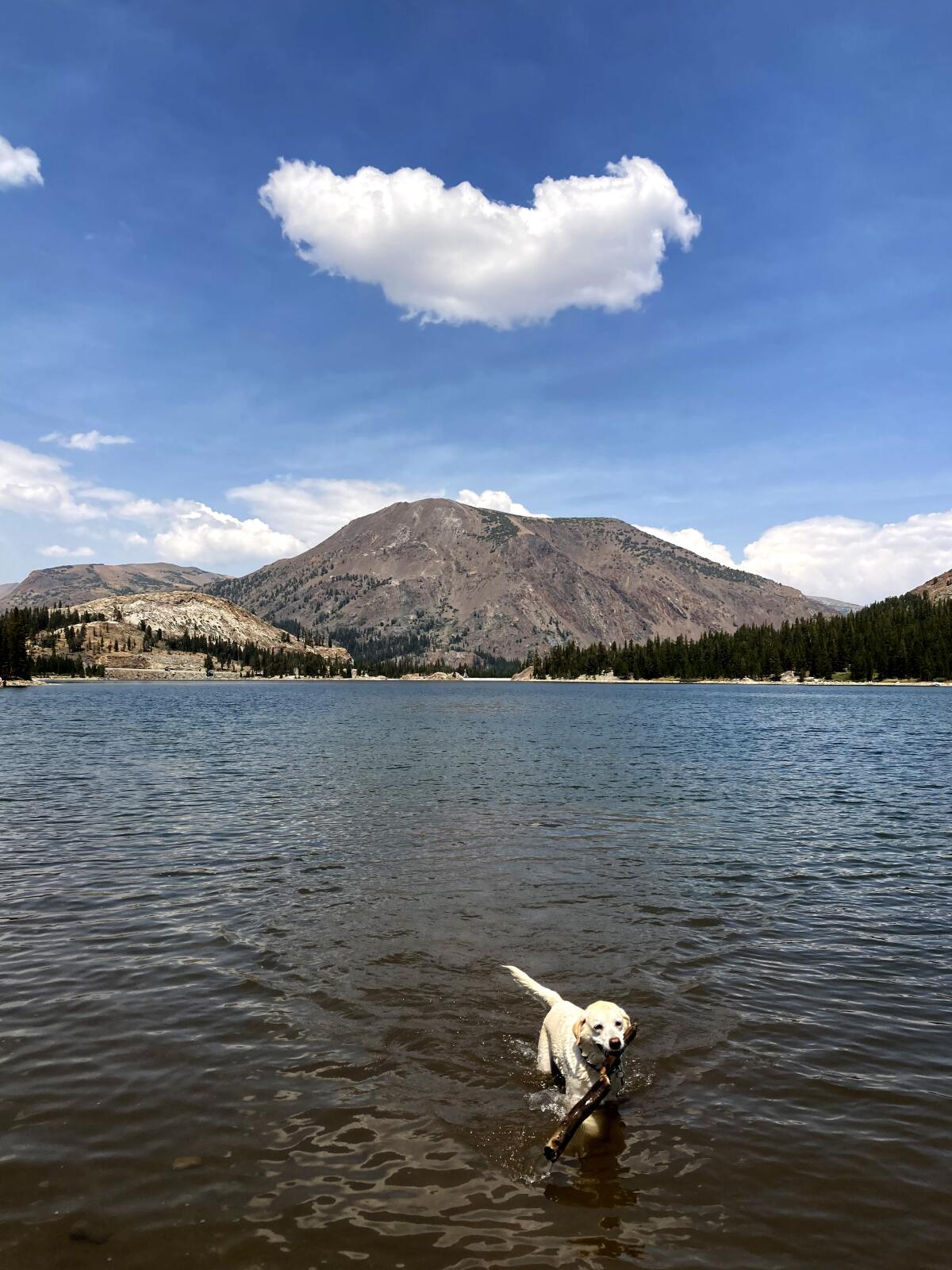
Did I make note of these little encounters before pandemic masks and distance?
The road swirled up, past the blinding white granite of Olmstead Point, past Tuolumne Meadows, and then, like always, a split-second of shock as I came out of Tioga Pass and the Great Basin unfurled in front of me, endless waves of arid rust and silver-gray.
Usually there is snow in the High Sierra even in July. There had been none.
::
In Colorado, I took the I-70 over the Continental Divide. Striped traffic barrels narrowed lanes. It looked like the Cat in the Hat had multiplied his headwear and tossed them up the mountain. After pandemic delays, the entire country was under construction trying to repair what had crumbled.
A thunderstorm pelted down.
Jackson Browne was singing that he didn’t know what happened when people died:
Like a song I can hear playing right in my ear that I can’t sing, but I can’t help listening.
As the song, a famous one I hadn’t heard before, continued, the moment froze. I thought of my friend’s cancer scans, the mountains burning behind me, the scorched basin I’d just crossed:
Perhaps a better world is drawing near, just as easily, it could all disappear.
::
In Sidney, Neb., a man in a bar told me he hoped California would fall in the ocean.
His partner, a checker at the local Safeway, told him he wasn’t being nice.
I had made a detour to this place touting its Old West past as “The Toughest Town on The Tracks.”
It was Sunday and downtown was deserted. One closed store had Winnie the Pooh, an American flag and a placard advertising pure honey in one window. In the other, an electronic sign alternated in blinking lights: Guns. Vitamins. Knives. Gifts. Silencers.
Two foley artists take their combination of Kundalini yoga and hypnosis to Los Angeles’ cemetery of the stars.
“Let’s get out of here,” I said to Murphy, the only ears around.
Before we got to the car, a group of people stumbled out of Hoon Dogs’ Bar. They said we had to come in because the owner, Hoon Dog, loved dogs.
The bartender Blue, who had blue hair, called Murphy to her. A man shooting pool yelled, “A bark back!” Enough people laughed that I figured plenty of them, like me, had once worked in a bar and knew what you called the person filling up the ice.
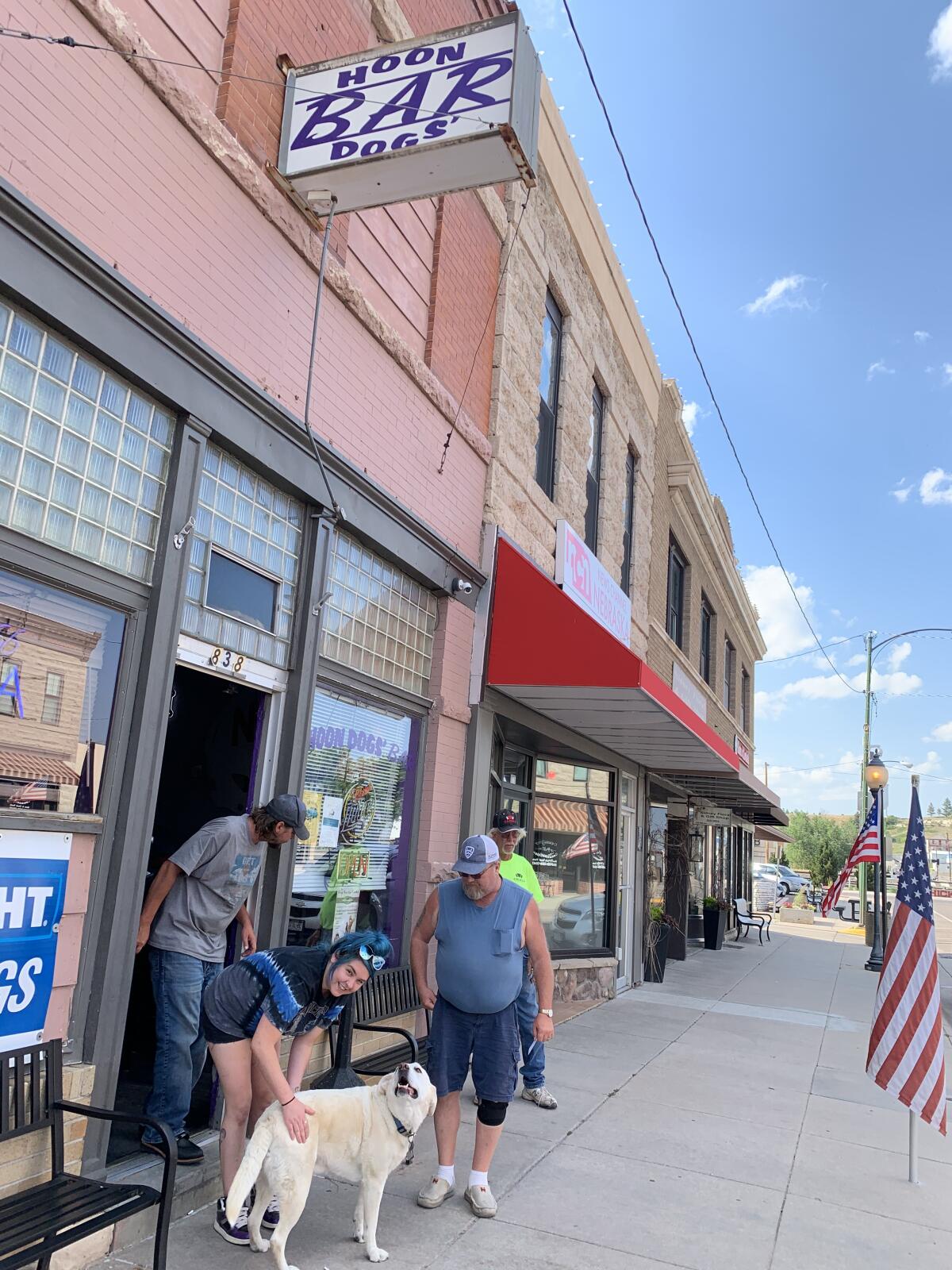
A man asked if it was OK to give Murphy jerky. I saw the flames printed on the proffered treat and walked over to give him kibble to offer instead.
That’s when he asked where I was from and wished destruction to all that I hold dear. He had a pot belly, a bum knee and a pack of cigarettes in the pocket of his sleeveless T-shirt.
I asked about the town. Other patrons nodded as he told the story. He once worked for Cabelas, a hunting and fishing store that had been headquartered in Sidney. In 2017 Cabelas and Bass Pro Shops merged. Executives said the last thing they wanted to do was destroy Sidney. Then they laid off 2,000 people, almost a third of the town. He had found work with a company building hemp yurts which he admitted were probably bought by people in California.
His earlier words had gotten under my skin because I was hoping this trip would help me start liking people in general again. I was tired of feeling that I lived in an angry country where good will was rare.
Maybe he felt the same. When I was leaving, he told me about a lake for Murphy. He gave me the name of the best burger joint around.
But I flashed antagonistic before I could stop myself.
“Thanks. But I’m your worst nightmare,” I said. “A vegetarian from California.”
He glared. Then he laughed.
I did too.
::
At a diner in Cozad, Neb., one man wore a cowboy hat and another a T-shirt with the slogan: “Eat Beef.”
The only fruit on the menu was canned peaches.
Murphy waited outside beneath a sign that read “Skinny people are easier to kidnap. Stay safe — eat pie.” I could easily have been in some rural California towns I know well.
After my fried, late breakfast, I took Murphy for a walk. We came upon a closed restaurant with a garden patio. A woman with platinum hair was hosing off windows. I shouted a hello — she only waved.
Susan Kuhlman was curious about me, but she had things to get done. Then she said to herself, “Sometimes you just have to put down the hose and say, ‘Hi, what’s your story?’ “
She chased me down. We chatted. She had lived in Italy. She and her husband returned to their home state of Nebraska and started the restaurant to be close to their aging parents.
A generation of American Muslims has grown up in a world in which one terrible day changed their country. Visibility makes young women wearing hijabs especially vulnerable.
She called over her husband Scott, made a cheese platter, opened a bottle of wine and we sat on the patio and swapped stories about lives that had taken us far from where we started, yet always called us back.
Susan banged her glass on the table.
“Scott, she has to meet Grandpa Don and see the ranch,” she said. “Let’s go.”
The ranch was tucked in soft green hills. Scott offered me a ride on a John Deere Gator —a cross between a golf cart and a tractor — to the top of the property.
I heard the beauty before I saw it. As soon as the engine cut there was the low thrum of bees and dragon flies. Dozens of butterflies floated through the purple blooms of cone flowers, iron weed and verbena. We looked over a deep green gorge.
“Once, all of this was gone,” Scott told me.
In the 1800s, U.S. soldiers burned it to destroy Native Americans’ food sources and trading route.
Scott’s father Don Kuhlman was in his workshop when we returned. There was a box of Fine Woodworking magazines with issues going back decades. He had built his house, shop, paddocks and barn with his own hands.
A Don’t Tread on Me sign with the coiled rattlesnake hung on the wall. The last time I saw this symbol it was on a flag carried by a mob overrunning the U.S. Capitol.
“What’s that?” I asked, pointing.
Don said that four years ago, when he was 83, a rattlesnake bit him. Scott threw him in the truck and rushed to the nearest clinic, which was 25 miles away, plus the time it took to open all the cattle gates. The medicine had to be shaken for an hour to activate it.
Don had felt his body shutting down. He didn’t think he would make it. But he got the shot in time and worked the next day.
He was a conservative Nebraskan, but he had hung that sign because he thought it was funny. A backstory can change what you think you see.
::
In Beresford, S.D., Gale Gors, born a Peterson, lives on a farm where a Peterson has lived for 125 years. Her father was born on the farm and died the day after he left.
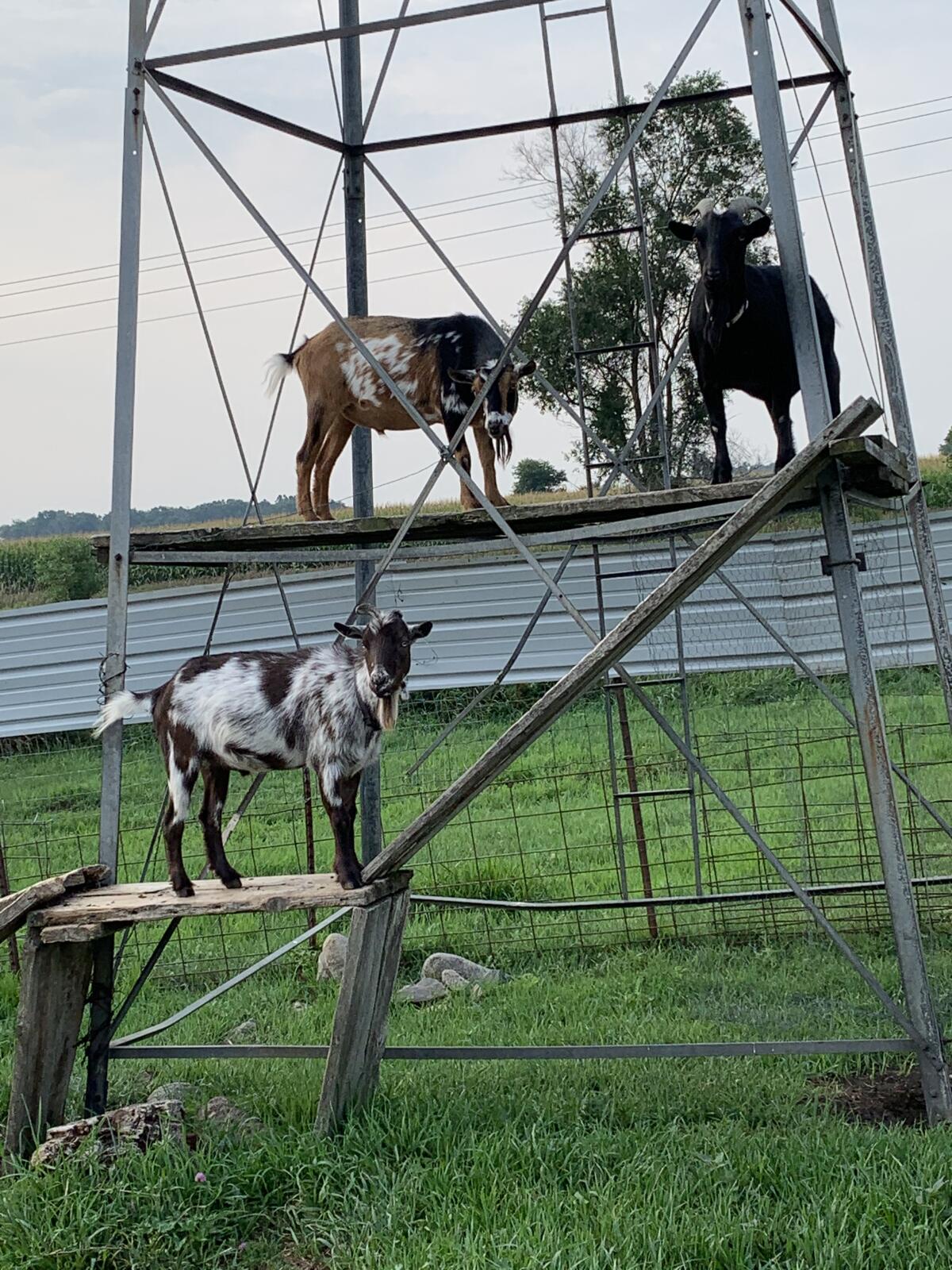
She has a red barn, three goats named Charlie, Pete and Earle — all after bygone relatives, a Lab that won a national dock-diving contest and a pollinator garden to help the bees and butterflies. There is a cottage that she rents out and I was that night’s guest.
When she saw Murphy she dropped down and hugged him.
“My God,” she said. “He looks just like my dog Vanna.”
She said Vanna had died on the same day as the presidential election and it was the worst day of her life.
“I had a husband walk out on me 25 years ago and that was nothing compared to it,” she said.
I thought, “Wait, which election?” I was in South Dakota and had passed many barns with Trump painted on them.
She meant the 2016 election. Gale said it had broken ties she’d had for most of her life.
She hadn’t been surprised her circle voted for Trump and they hadn’t been surprised she didn’t.
“They’d vote for Lucifer himself with horns sticking out his head if he was pro-life,” she said.
But that was the way it had always been. So she thought they would carry on as they always had, being helpful neighbors, exchanging recipes and having get-togethers.
Then one day she broke the unspoken pact between her and one of her closest friends, to not talk politics.
“Don’t the lies bother you?” she asked about Trump.
Her friend said they were only lies depending on which television station you watched.
“She had no curiosity, no need for a truth we could share,” Gale said. “I’ve been lonely around here ever since. I wonder sometimes whether she misses me too.”
Later that day, I met a young woman who had gone to high school in the area. She said she’d had a hard time because her family moved there from Texas. That made her an outsider.
“You were ostracized for being from Texas? What would it be like for someone who was really different?” I asked.
She had struck me as a meek girl. But she raised her fist in the air. “Black Lives Matter,” she said.
::
America rolled by and my mind wandered. I kept returning to the day my friend and I declared lemon and dark chocolate the perfect gelato combination. Each time I thought about that moment, something rose up from my chest and tried to strangle me.
The trait I envied in my friend was her sureness. She wore pink sunglasses and golden velvet pants, declared her musical tastes with utter conviction and always believed everything would work out with a certainty I save for ice-cream flavors. She was also good with words. She felt every story, no matter how dark, held power and humanity in the act of telling it.
I was running out of miles to become as sure and strong as I needed to be.
::
In tiny Postville, Iowa, I saw a sign that said “Hometown to the World” but I didn’t know what that meant. The motel I had booked looked wearier than ecstatic reviews of vintage Americana had led me to believe. Two boys were riding bicycles in the parking lot. They said they lived at the motel.
They stopped to pet Murphy. I asked them their names. One said “Harlan.” The other said that he didn’t tell anyone his name.
I asked if he was on the lam.
He said he had trust issues.
When I saw my room with its window AC unit and questionable bedspread, I would have moved on to the next town, but there were no rooms available and it was 90 miles away.
I drove to town and along the way saw an Orthodox Jewish man with side curls and a flat, black hat walking past cows in a pasture. A white couple sat on the porch of a boxy house with a pin-neat yard. I asked them the best place to eat. In the same accent revered in the movie “Fargo,” the wife told me the Mexican restaurant at the town’s only intersection. “Have a nice visit, now,” she called after me.
In the park, a man with a megaphone shouted about el amor de Cristo to a small group of Latinos. On the main street, I stopped at a little store called The African Market to buy water. Two men sat in chairs outside the door and I thought they might be war refugees because one was missing an arm.
I greeted them, stepped inside and met Mushtak Bireh. She is 10. She was wearing a grass-green hijab. She asked if she could direct me to anything. Her 5-year-old brother Musab trailed after us, peeking out from behind boxes.
Mushtak said I could watch her Tik-Tok videos if I wanted. Her mother, Foos, behind the cash register, waved us over so she could also watch Mushtak lip-sync and gesture.
“But at school, I’m very shy!” Mushtak proclaimed.
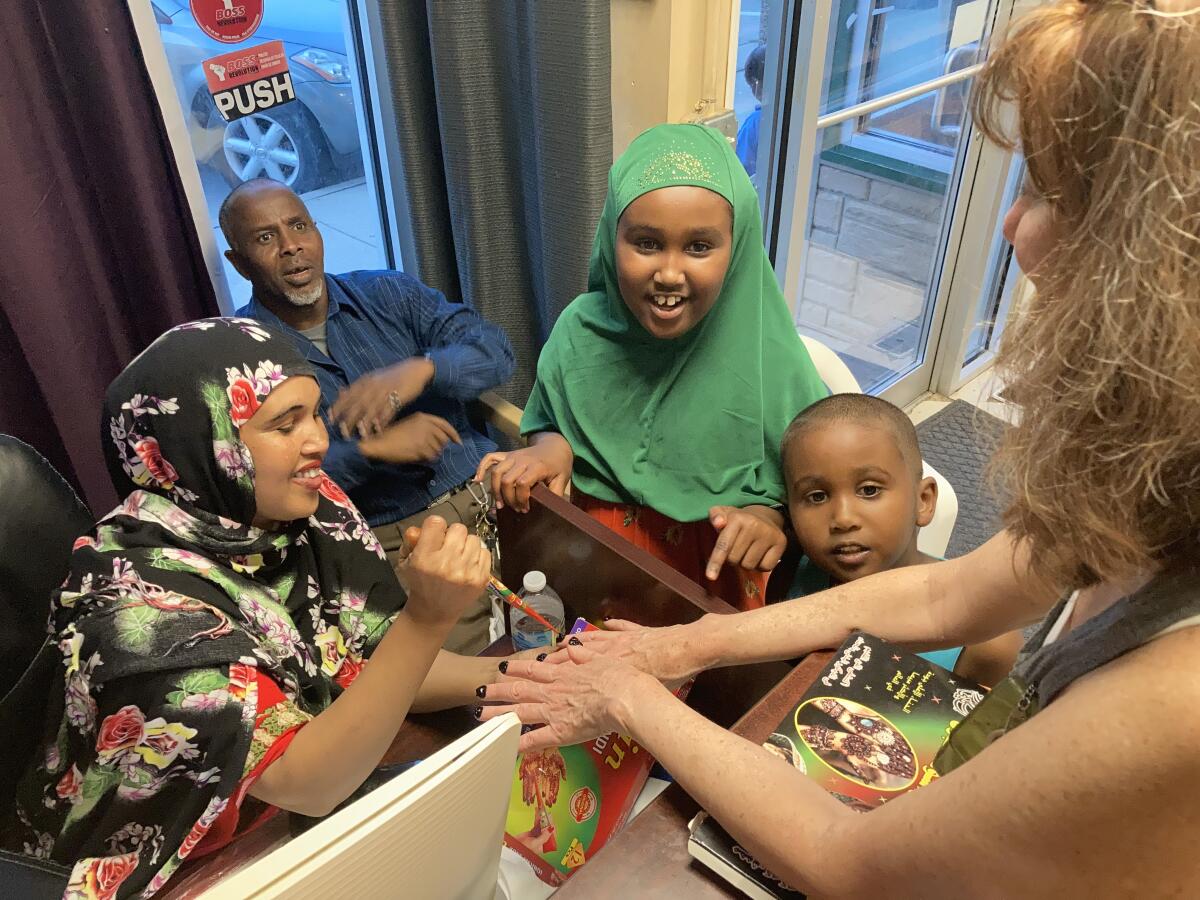
Foos had henna designs on her hands which I admired. She said something to Mushtak in Somali. Before I knew what was happening, Mushtak had brought henna and Foos was globbing black gelatinous dollops on my fingernails. She said I needed to wait a half-hour before washing it off. In the meantime, Foos shot Snapchat videos. A woman in a town of 2,500 made fish lips and batted her eyes at her 19,000 followers.
In 1987 Postville was a dying place. It seemed to catch a break when a Hasidic Jewish family bought the defunct meat-packing plant on the edge of the community and made it a Kosher plant.
Ukrainian and Russian immigrants came to work bloody, low-paying jobs. Then, later, workers from Guatemala. Many of the Guatemalans came from the same two villages. In the evenings they strolled around town with their children as if it was a plaza. Some people fumed that Postville was changing. But most went about their lives and coexisted.
Then on the morning of May 12, 2008, two black helicopters, more than 10 white vans with blacked-out windows and 900 agents with guns and bulletproof vests raided the meatpacking plant.
They arrested anyone who looked Latino, including people who had legal residency. They led them single-file in groups of 10, shackled in chains at the wrists, waists and ankles to the waiting buses. In town, people hid Latino families in their attics and teachers shepherded their brown-skinned students to phones to call home.
The town lost almost one-third of its residents from the raid and the aftermath. Businesses, the school and the tax base crumbled.
Now, a dozen years later, a smaller meatpacking plant had opened where the former plant used to be. It employs many Somalis. Their status as refugees protects them from raids.
“It’s good growing up in a small town, because I know everybody,” Mushtak told me. “And I really like the Mexican bakery and the Kwik Star and I have a lot of friends.”
Leaving Postville, I stopped in front of a city banner that read “Welcome” in Spanish, English, Ukrainian, German, Irish, Somali and Hebrew.
::
I took a side trip to Grand Rapids, Mich., to see my friend Dustin Dwyer. We had been in a fellowship program together before his youngest daughter Dottie was old enough to talk. But she had babbled at Murphy who appeared to listen. Dottie was 4 now and could talk a blue streak.
Dustin is a radio reporter and he had covered his city’s protests over the murder of George Floyd, a Black man killed in Minneapolis in 2020 by a police officer who pressed his knee into Floyd’s neck for nine minutes and 26 seconds while a crowd pleaded for him to stop.
We drove down a street where Dustin had watched people try to light a building on fire. He pointed to the garage where he had been parked on an upper level, filing a story, when he heard an explosion and a police car went up in flames. He ran down and for a moment was the only person watching it burn.
I couldn’t see any damage on the streets Dustin was waving at. He said part of him wished the damage showed.
He had covered local stories of police abuse. He didn’t want to pretend the rage now hidden by swept streets and repaired glass didn’t exist.
We returned to Dustin’s house to find Murphy had stolen Dottie’s stuffed toys and raided the kitchen garbage.
We were picking up the trash when Murphy barked, ran out the door and jumped on the mail carrier, who only laughed.
“Thank God he wasn’t mad,” I said, dragging Murphy inside.
“Nah, he’s a great guy,” Dustin said, then his face went serious.
“His girlfriend was a mail carrier too. She died of COVID-19. They both got it.”
Over lunch we’d been talking about the pandemic and what it would be like going forward.
“I think this is what it will be like,” Dustin now said. “I think that for years we’ll be laughing over something like Murphy rushing the mailman and then suddenly we’ll be talking about the mailman’s girlfriend dying. That’s how trauma works.”
::
In New Hampshire, I was following random roads just keeping the car compass on “N.” I passed a house with a yard sign that read “Truth Matters.”
I was curious. Was this a small-town newspaper editor? I turned the car around.
The woman who answered the door said that I needed to talk to her partner because he was the one who put up the sign.
A disembodied voice introduced himself as George Peterson. He was speaking through his home-security system from his office in town. I said that I felt weird talking to a doorbell. He agreed to meet.
When George arrived, he invited me in. He was a potter and there were beautiful ceramics behind glass. He had a degree in geology which corresponded with mineral glazes and he had studied with a woman artist in Japan. There was a photo of Prince on the wall.
George hugged his partner’s grandson, a little boy with a pacifier, and offered me a glass of water before we sat down to talk.
He believed that Trump won and the election was stolen.
He said that he would have invited me in if I wasn’t white. And he didn’t believe that the U.S. was a racist country. Look around. Anybody could be anything in America.
He was the health officer in his community, but doubted the safety of COVID-19 vaccines.
George said his son went to Yale and that he had paid for his education. Sometimes George grew so frustrated with his son disparaging his beliefs, that he thought about cutting ties. His son always convinced him that they could navigate their differences. He told George that he didn’t want to lose his father.
::
In Maine, there was a lake with mist rising off it in the mornings, the call of loons, a dock for Murphy to belly-flop off. There were blueberry fields and endless ice-cream shops.
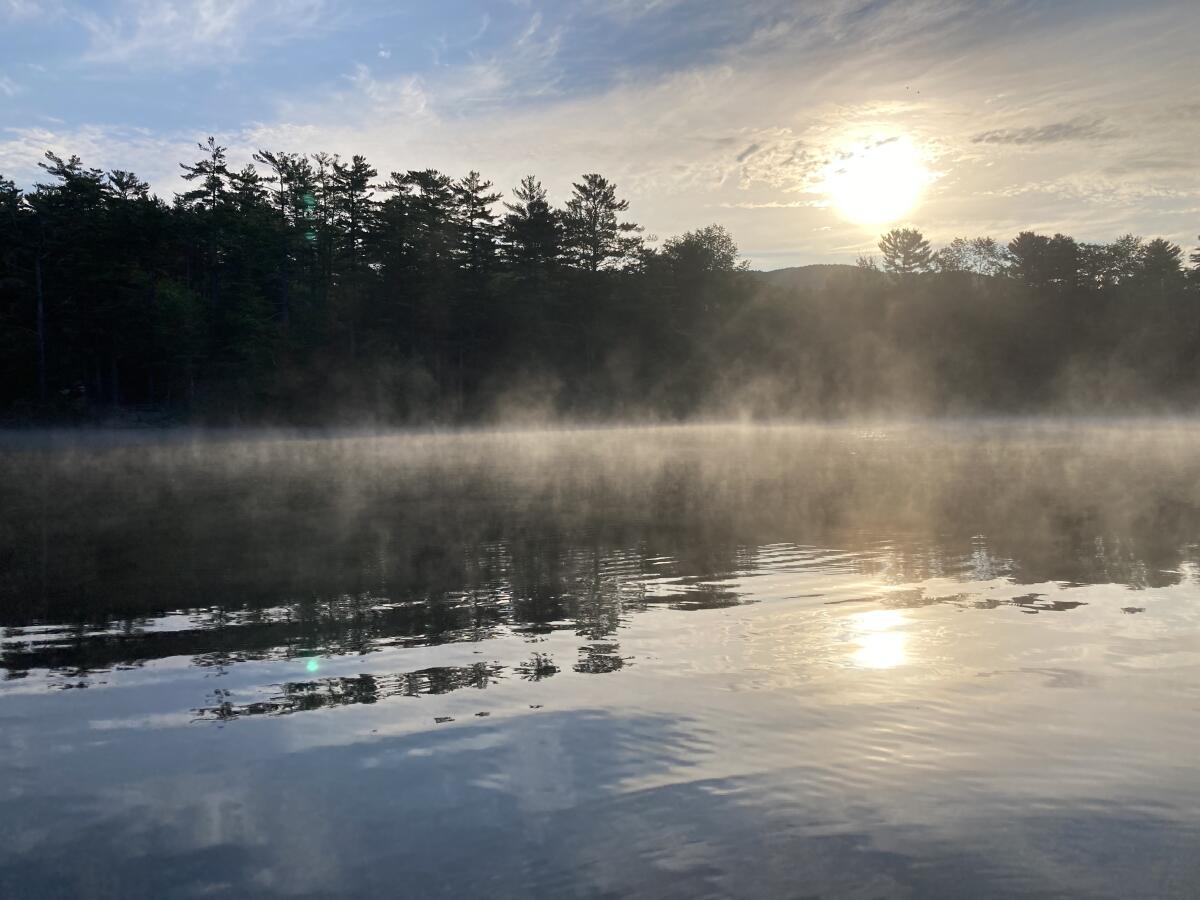
One morning, my friend and I sat on the deck and wept, each in her own world, watching the water. But mostly, we got on with enjoying ourselves.
She said that she felt lucky and grateful. She just would have liked to have more time.
Acceptance is a tricky word. It has connotations of giving in. I think it’s more that instead of huddling into a ball and trying to block what you can’t bear, you face the joy, the absurdity, the sorrow, the rage. Then you can get on with it.
Maybe it works that way for a country too.
More to Read
Sign up for Essential California
The most important California stories and recommendations in your inbox every morning.
You may occasionally receive promotional content from the Los Angeles Times.
